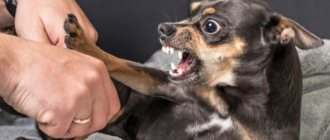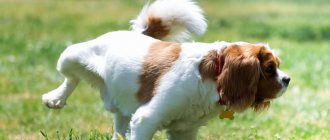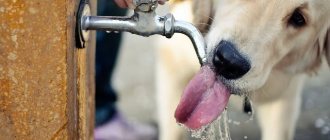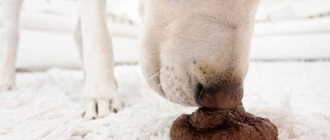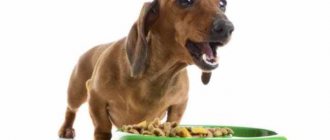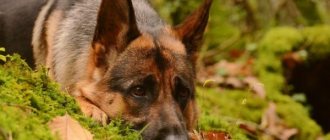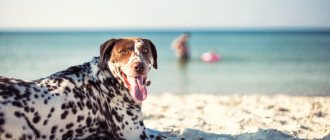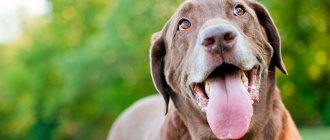Behavioral problems
Some dogs, when happy, lose control of their bladder.
Whether it's your return home or a visit from friends or any other exciting factors, all of them can trigger your pet. Moreover, often dogs do not even try to take a position for urination, happily smearing everything on the floor with their tail. Solution.
What you shouldn't do is scold your dog. Shouting and slapping can only make matters worse and lead to the problem of “submissive urination” that is common in many social animals. What can help is your peace. When you return home, do not rush to rush to your pet with exclamations of joy. This is not acceptable in a pack. Leaders most of the time ignore the rest of the pack, and the latter themselves must earn attention through devotion and obedience. Do the same. Ignore your dog until he calms down and then reward him with attention.
Be sure to talk to those close to you who communicate with your pet so that they also follow the rule: no strong emotions towards the dog.
One of the reasons why a dog pees for joy is the so-called “puppy behavior”
If a dog flicks its tail finely and often, makes a sweet face and urinates at that moment - this is it. Thus, the dog tells someone who, from its point of view, may be big, strong and angry: “I’m just a little puppy, because you, so huge and serious, will not offend a defenseless baby?”
Therefore, if you notice such behavior in your dog, you should think about it: why does it even occur to your dog that you need to be calmed down? Perhaps she has some old experience related to other people. Or maybe she is just a very sensitive and impressionable person, and your behavior, which another dog would perceive as completely harmless, is perceived by your dog as a threat.
For example, you come back from work, and the first thing you see is things knocked over from the table. You don’t seriously swear at the dog, of course, you don’t hit it or scare it, you just scold it: “What’s wrong, you’re such a dog, you made a mess and didn’t even clean up after yourself.” There are dogs who, in response to this, will joyfully rush around the room, stand on their ears and yell: yes! Yes! It's a mess! Mayhem is fun! The owner is having fun too! Hooray!!!
And there are suspicious people who immediately get worried: “I came back from work - and there’s no way to pet me, I immediately grumble. He probably doesn’t love me.” Of course, the dog doesn’t really think so, but he is quite capable of associating your return with your manifestation of negative emotions. Several such episodes will accumulate - and the dog will begin to overly calm you down upon your return, make a “guilty look”, and then it’s not far from peeing. In this case, you need to work on your dog’s trust, that is, become completely safe and predictable from the dog’s point of view. We will definitely tell you how exactly to achieve this separately.
Untimely walking
If you are late walking, and your pet drank a lot of water the day before, this may be the reason for his urination. But unlike behavioral problems, this usually happens sporadically. The only thing worth paying attention to is that the dog drinks often and a lot. In hot weather and during physical activity this is acceptable, but in other cases it is worth contacting a veterinarian who can test the dog’s blood sugar level.
Solution.
Understand, forgive and walk the dog at least twice a day.
Causes
Incontinence can be true or forced (imaginary). In the first case, the dog involuntarily urinates due to a disorder of innervation, which is a congenital deformity, a consequence of injury, or senile weakening of reflexes. In sterilized dogs, the hormonal status changes, so the same conditions occur as in older pets.
Imaginary incontinence develops as a symptom of an underlying disease. In both situations, the warning sign disappears if the cause is eliminated.
Natural
True incontinence is characterized by constant leakage of urine. The animal secretes urine drop by drop while moving or resting. The owner notices puddles at the site of the pet's rookery.
The following causes of incontinence are considered natural:
- Stressful . Arises as a result of fear or joy. A faithful dog perceives the visiting owner as the leader of the pack. Urination is a sign of complete submission.
- Uncleanliness . The dog was not trained or it was done unprofessionally. Often a dog leaves marks in inappropriate places to attract the attention of an owner who is indifferent to him. Some dogs consider themselves the dominant animal and mark the territory of the apartment out of spite. Sometimes being unclean is a cry for help. The dog signals that he is sick and needs to be taken to the veterinarian.
- Marking the territory . This is not a pathology, but a norm. Adult animals place scent marks during periods of increased sexual activity. The female signals to the male that she is ready to mate. The male warns the rival not to enter his territory. Males prefer to spray urine on vertical surfaces - posts, corners, etc.
This is my territory
Diseases
The following causes of urinary incontinence are considered pathological:
- Spinal injuries . Infringements occur and innervation is disrupted.
- Relaxation of the sphincters of the urinary reservoir and urethra . Elderly dogs suffer, in which the pathology developed as a complication of chronic diseases. The disease also occurs at an earlier age. The sphincter relaxes and does not hold urine in obese dogs, mainly females. In castrated animals, pathology develops three years or later after sterilization.
- Ectopia is a congenital defect. The ureters open directly into the urethra, bypassing the reservoir. There is no sphincter, so urine is released in drops. Ectopia is characterized by the presence of concomitant inflammatory diseases of the genital organs.
- Cystitis is inflammation of the bladder. The pathology is provoked by microflora that has penetrated the genital tract due to weakened immunity. Bitches get sick more often than males, due to the proximity of the urethral opening to the anus. In addition to urinary incontinence, inflammation of the bladder, you will find the following symptoms:
- whining during bowel movements;
- urine becomes cloudy and smells foul;
- the pet feels nauseous, tosses and turns, and cannot find a comfortable position;
- loss of appetite.
demonstrative defecation anywhere;
The development of the disease is facilitated by improper maintenance and unbalanced nutrition. If you notice the above symptoms, seek veterinary help. Acute cystitis is well treated and ends in recovery without complications. A chronic disease requires lifelong treatment.
- males do not lift their paws, but sit down;
bitches vigorously lick their genitals;
Sometimes urolithiasis occurs as a result of untreated cystitis. Other reasons are nutritional imbalance in protein. A high percentage of low quality protein contributes to an increase in the concentration of uric salts and precipitation. Neutered animals are predisposed.
Complete cessation of urination is an ominous sign. Stones block the ureter, urine stops being released. The animal falls into a coma and dies.
- Pyometra is a purulent inflammation of the uterus. The disease develops in females with reduced immunity after abnormal whelping or as a result of genital infections. Additional signs include a painful, bloated abdomen. If there is no vaginal discharge, this is bad. Pus accumulates in the uterine cavity. The disease is life-threatening.
The puppy is peeing out of joy or fear - what to do?
If the puppy starts peeing at the sight of you, then never punish him
, even if your favorite palace suffered from his actions. Go ahead and get a rag and a bucket, it's time to clean up a little :)
Often, a puppy will pee when its owners bend over to pet it. He, at the level of instincts, conducts a ritual with you, during which you, bending over the dog, stroking the head, neck and back, as if declaring your leadership, and the puppy takes a subordinate position by demonstratively peeing. That is, your behavior, in his eyes, is dominant. There is no point in punishing him, he simply cannot understand what they want from him - his instincts take over.
Punishment, in this situation, can “slow down” the puppy, or even a raised voice can lead to a repetition of the puddle scenario.
How to react
? If the puppy is peeing, then when you go home, you can pay attention to the puppy and stroke it only after it has calmed down. Until then, ignore him. An overexcited puppy will definitely make a puddle if he hears the owner’s joyful voice and receives a stroke. Don’t let him jump on you with his paws, read more in the article “How to stop a dog from jumping on people?”
Perhaps the puppy will pee at first, but if you pay less attention to him, giving him the opportunity to calm down, he will calm down. Although he will continue to rejoice at you, but without puddles. Just don’t break the rules - just ignore the puppy so that he cools down a little, and you can greet him after that, but only by squatting. There is no need to bend over like a dog.
If the puppy pees out of fear
, then perhaps he is just a small puppy who was frightened by the sharp voice of the owner, the presence of another dog, or an acquaintance who stopped by. This happens to older dogs too. Just don’t think that a guard breed puppy or an adult dog will be a bad guard. Start behaving correctly with him, and, very preferably, train him.
It’s one thing to wean a puppy from peeing anywhere and toilet training, where punishments are allowed, but another thing is to wean him from peeing out of fear. Read more about toilet training: “How to toilet train a puppy” and “How to stop a dog from peeing at home.”
Therefore, if the puppy peed after your punishment, for example, for chewing furniture, then in this way he wants to show you his submission. You may have punished your dog too harshly. Therefore, for lovers of physical influence, a short story that can become the future of an aggressive and irresponsible owner.
Short story. I don’t remember the dog’s name, but it doesn’t matter. I didn’t immediately understand whether it was a dog: a thin, frightened animal was trailing behind its owner on a leash, which, when I took it on the leash, managed to wet itself several times (!). As soon as I bent down to stroke her, she wet herself again.
In general, I made puddles all over the site. The owner said that she is often offended by the dog that lives in their yard. But he himself does not react at all. In addition, he is very cruel to her and tried to punish her for these very puddles, until he learned that it was absolutely forbidden to do this.
Even such an instance cannot be considered “running”. If you behave normally with the dog, give it good training, then everything will be fine. Moreover, this is a puppy, and after a course of training, so to speak, normalization of everyday life, as well as the development of anger in the future (don’t do this yourself), everything will be fine with the dog. As a guard and protector, she will succeed in 95% of cases. The remaining 5% are extremely severe cases and incorrect actions of the owner or trainer.
Every normal and responsible owner should know how to punish a dog or puppy, as well as how to teach the “fu” command to a dog. You need to understand where punishment will be appropriate and effective, and where it will be absolutely useless.
Why do dogs pee during play and when meeting their owner?
If we take into account the nature of the situation when such behavior occurs, it becomes clear that we are not talking about natural puppy uncleanliness. Dogs empty their bladder unexpectedly while standing or even while moving.
This always happens against the will: in a state of excitement, the animal cannot control the sphincters, they open and what happens happens. I am sure that anyone can remember at least one moment when they themselves were faced with the problem of unwanted urination.
Why don't all dogs pee when they meet?
So far no one can give a clear answer as to why some dogs have this problem and others do not. A dog's emotionality plays a certain role, but not all emotional dogs necessarily pee when they meet their owner. Apparently, the main role here is played by a genetic predisposition to a particular type of behavior.
Does individual experience have an impact? It is quite possible, but, in my opinion, it is more of a conditioning plan: it further increases the dog’s excitement in certain situations, but does not create it. For example, a dog owner who likes to play outdoor games with the dog and prefers an emotional exchange of greetings, thereby exacerbating the problem. In this case, a young active dog, which has been alone for a long time, experiences excessive excitement and pees when its owner returns.
However, then a reasonable question arises, which, it seems to me, directly refers to the role of genetics in the development of the problem: why is the created tension not discharged by urination in all dogs?
The answer is yet to be found. It is possible that in some cases there may be some lack of communication or activity, or that the problem may be explained by agitation combined with a full bladder after being cooped up for several hours. There is no doubt that the urge to urinate experienced by the animal significantly complicates the situation.
Should you punish your dog for this behavior?
Scolding your dog for puddles during play is pointless and counterproductive. Photo thesprucepets.com
Punishment is unlikely to be considered an effective way to solve the problem, since it will not help train the dog to suppress the urge to urinate in emotionally charged situations. Those instances where the use of punishment appears to be successful appears to be due to a change in the dog's emotional perception of the entire situation.
With regular punishment, greeting does not cause enthusiasm and excitement in the dog, but “mixed feelings”, rather bordering on fear, which, according to most dog owners, is an undesirable metamorphosis.
Fortunately, most owners understand this and quickly stop using punishment. If the problem is severe enough, it is best to try to create conditions that prevent the dog from becoming overexcited in key situations.
How to help a dog?
Typically, urination does not occur in any situation involving play or exchange of greetings. Most often this happens when the dog is extremely excited and his bladder is full. By eliminating these types of situations, such as not returning the dog's greeting at a certain time, except when greeting outside the living area where urination is not a problem, or not allowing the dog to become further agitated if it is already agitated, this may help alleviate problem.
When the relationship between the amount of time a dog is cooped up and the frequency of the problem is clear, it is logical to think about how to avoid leaving your dog alone for too long. Most likely, this will significantly reduce the excitement that the dog experiences when the owner returns.
It is clear that if you take your dog outside more often, his bladder will not become overfull. Since the dog's owner is at work throughout the day, it is advisable to ask one of your neighbors to periodically walk the dog or seek the help of a pet walking service. This will be especially desirable for the owner of a young dog, as their dog will have another opportunity to play.
Sometimes, despite all efforts, problematic situations cannot be avoided. The key to solving the problem may be to initiate and reinforce such forms of dog behavior that, if not completely eliminate the possibility of urination, then at least reduce its likelihood.
The choice of an alternative form of behavior in problem situations depends on specific conditions. For example, to change the form of greeting, the owner can take the dog's favorite toy with him and, upon returning home, throw it to his pet before starting the usual greeting ritual. You can consciously intensify some form of play by avoiding games that involve urination.
Sometimes it is possible to change a dog's behavior and reduce the likelihood of urinating in problematic situations by teaching the commands of a standard obedience course. During the training, the dog is taught special commands, with an emphasis on the ability to wait, that is, endurance. Having mastered the necessary skills well, the dog will learn to cope with excess excitement and quickly switch, in potentially problematic situations following the owner’s commands.
Liked? Subscribe to my YandexZen channel and see pictures on Instagram.
© 2019-2022 Alexander Smirnov @kinologsmirnov.ru. Respect the work of the author: copying any part of the material is possible only with indication of authorship and a link to the source.
How to stop a dog from peeing out of fear or joy?
- If a pet does this when meeting its owner, it thus expresses its submission to this person and agrees with its position. A kind of hierarchy. In such cases, it is necessary not to greet the puppy until he calms down. That is, you enter the house and usually, out of habit, the first thing you do is bend over and start petting your pet. It is advisable not to do this, and at first ignore the animal until it calms down, after which you can play with it;
- The puppy pees from punishment, in such cases you need to reconsider your behavior. Apparently, in some situation the punishment for the baby was very strict, they remember this information well. Therefore, it is worth monitoring the tone of your communication and not raising your voice. Punishing the dog to do it more leniently!
By following these tips, you can wean your pets from peeing from an excess of emotions and you won’t have to wipe up puddles anymore!
